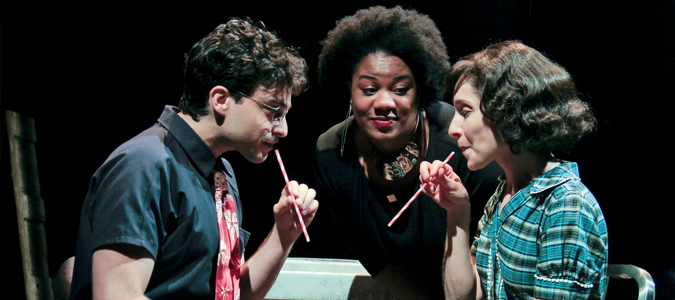

Ethel Sings
Opening Night: June 6, 0201
Closing: July 13, 2014
Theater: Beckett Theatre
Ethel Sings follows Ethel Rosenberg, the determined mother, singer, writer and actress, and her husband Julius, who become swept up in the fatal Red Scare hysteria of the 1950s. Julius’ need to “save the world” becomes his undoing, and Ethel’s love for her husband becomes hers.
BUY TICKETSREAD THE REVIEWS:
June 8, 2014
America is adept at whipping itself into frenzy over the “great unknown”. With a penchant for jingoism and a simple minded view of all “isms”, we should use what happened to Julius and Ethel Rosenberg as a lesson on mass hysteria. All reason, as well as our self-professed piety and sense of justice, go out the window when “they are gonna get us”. We’ve been through it since Salem, southern lynching, Sacco and Vanzetti. In the Rosenbergs’ time, the Boogie Men were the Commies among us. Today our enemies have multiplied with the dumbing down of education, an infantile Congress, 24-hour cable news, YouTube, Facebook et al. The story of Ethel and Julius should be told now as a parable, since 9/11 rocked us into a new wave of hysteria. This piece doesn’t serve Ethel Rosenberg’s legacy. It is a highly stylized production that may have been tagged avant-garde in the Sixties but comes off dated, forced, and ridiculous today. (Tracy Michailidis) as Ethel Rosenberg recites her lines like she was in a school play, without real emotion to move us.
READ THE REVIEWJune 7, 2014
For those growing up in the 1950’s, the case of Ethel and Julius Rosenberg, who were tried and convicted of espionage, was shocking and controversial. Both were sent to the electric chair on June 19, 1953 a day after their 14th wedding anniversary. Joan Beber’s ernest, yet uneven, play examines their lives, mostly through telling Ethel’s story. Will Pomerantz, the director, asks the question in his notes, “why Ethel Rosenberg and why now?” In going over the script, he was struck by how current the issues raised by the play still remain today. “The Rosenbergs were liberals, Jews, labor activists and communist sympathizers in an era of virulent anti-communism and anti-Semitism. Their trial became a show trial for the rise of McCarthyism, and although the actual evidence against them was inconclusive at best, they were found guilty after only two weeks of testimony. They were the only Americans executed for espionage during the entire Cold War, and, at the time of her death, Ethel was only the second woman ever executed by the federal government up to that point in our country’s history.”
READ THE REVIEWJune 6, 2014
It’s usually not the best sign when the director’s note is more enlightening about a subject than the actual play it accompanies. Such is the case with Joan Beber’s Ethel Sings, The Unsung Song of Ethel Rosenberg, which is making its off-Broadway premiere at Theatre Row’s Beckett Theatre after running last summer at Walkerspace. Redundancies in the singsong title aside, the story of Ethel Rosenberg, the only woman to be executed for espionage during the Cold War (at, erm, Sing Sing prison), is an endlessly fascinating one. It also has major implications about our national identity that reverberate to this day. How exactly did the United States government come to execute two people who were convicted of a nonviolent crime, thereby orphaning two young children? The event takes place in a prison where foreboding electrical equipment towers over the stage and inmates in blue prison jumpsuits shuffle across a dirty checkered floor. A tall-backed electric chair sits behind a scrim upstage center, a constant reminder of where we’re headed (scenic design by John McDermott). The 10-person ensemble reenacts the story of Ethel Greenglass (Tracy Michailidis): her early interest in opera, how she joined the Young Communist League, and how she met her husband, Julius Rosenberg (Ari Butler). Julius is a committed Communist, worried about the plight of the Jewish people in Europe and convinced that the salvation of the world will come from Moscow. The play goes on to show how Julius and Ethel were arrested, tried, and sentenced to death for passing nuclear secrets to the Soviet Union.
READ THE REVIEWJune 10, 2014
In Ethel Sings: The Unsung Song of Ethel Rosenberg, the playwright Joan Beber issues a posthumous pardon to Ethel Rosenberg, executed for conspiring to commit espionage in 1953. Debate remains about Rosenberg’s complicity in spying by her husband, Julius. But the play never really examines any of the contradictions of the testimony, nor does it consider the implications of aiding the Russians at the dawn of the Cold War. Instead, Ms. Beber, a cousin of the Rosenbergs, depicts Ethel (Tracy Michailidis) as a blameless wife and mother, guilty of nothing worse than feeding her son ice cream for dinner and worrying about her weight. The set never wavers from Ethel’s prison cell, even as the play tours her past and present. Like a morbid episode of “This Is Your Life,” the play runs from her days as a high school thespian (she starred as St. Joan) right up to the electric chair. Loraine (Adrienne C. Moore of “Orange Is the New Black”), Ethel’s imaginary cellmate, guides these recollections. A figure in flowing clothes and hoop earrings, Loraine is prone to statements like this: “I’m multicultural, endlessly dimensional, exuding, including but not excluding anything.”
READ THE REVIEW




















